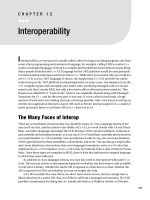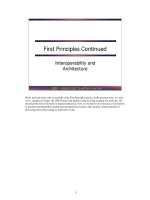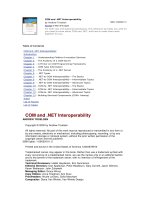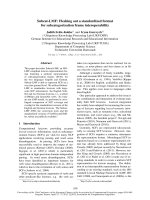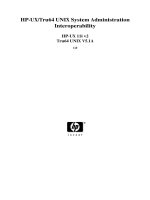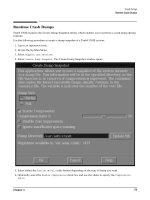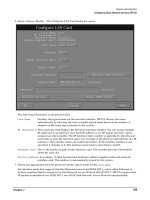Interoperability
Bạn đang xem bản rút gọn của tài liệu. Xem và tải ngay bản đầy đủ của tài liệu tại đây (845.52 KB, 38 trang )
317
■ ■ ■
CHAPTER 12
Interoperability
I
nteroperability, or interop as it is usually called, refers to using or invoking program code from
some other programming environment or language, for example, calling COM or native C++
code in a managed language. Interop is a complex but beautiful and extremely necessary thing.
Many people think that the C++/CLI language for the .NET platform would be used primarily
to extend existing code bases written in native C++. While there is no reason why you could not
use C++/CLI as your .NET language of choice, the support that C++/CLI provides for native
code interop on the .NET platform is indeed impressive. In many cases, you simply turn on the
/clr compiler option and recompile your native code, producing managed code (or at least
mixed code that’s mostly MSIL but with a few native x86 or x64 instructions mixed in). This
feature was called IJW or “it just works” when it was originally released along with Managed
Extensions for C++. And for the most part, it was true. It’s now called mixed mode. A huge
amount of work went into making that type of interop possible. Also, even if you’re writing an
entirely new application that uses a native API, such as Win32, interop support in C++ makes it
easier and much faster to call these APIs in C++ than it is in C#.
The Many Faces of Interop
There are several kinds of interop that you should be aware of. Cross-language interop is the
one you’ll see first, and that refers to the ability of C++/CLI to work closely with C# and Visual
Basic, and other languages that target the CLR. Because of the common platform, common IL,
and assembly and metadata formats, you can use a C# or Visual Basic assembly pretty much as
you would another C++/CLI assembly. You can reference it with #using, you can create instances
of the types declared in those assemblies, call methods, and so on. You can also go a step further
and create inheritance hierarchies that cross language boundaries, such as a C# class that
implements a C++/CLI interface, or a C++/CLI class that inherits from a class written in Visual
Basic. Once these types are compiled to MSIL, there is little that indicates the original language
in which they were authored.
In addition to cross-language interop, you may also need to interoperate with native C++
code. The way you choose to interoperate depends on whether you have source code available
or only have a binary, whether the native API is exposed as a function or a class, whether the
API is exposed via COM, and whether you can recompile the code.
Let’s first consider the case where you don’t have source access, and you simply have a
library function in a native DLL that you’d like to call from a managed environment. The CLR
provides a mechanism for doing this; it’s usually referred to as Platform Invoke, or P/Invoke,
Hogenson_705-2C12.fm Page 317 Wednesday, October 18, 2006 5:13 PM
318
CHAPTER 12
■
INTEROPERABILITY
suggesting that you are invoking a platform-specific binary. Basically, P/Invoke lets you create
a managed entry point to your native function. If the native code you want to call is not exposed
as a native, exported function, you can’t use P/Invoke. P/Invoke works well for calling Win32
APIs, and it is widely used in CLI languages for this purpose. There are some complexities
in using P/Invoke, since you have to declare managed analogs for any native structs that are
passed into the function, and this is sometimes tricky. Also, there is considerable overhead due
to switching from managed to native code and back again, as you’ll see.
In addition to P/Invoke, the CLR provides support for COM interop. You can create instances
of proxy objects to COM objects in managed code. Usually this will involve creating a wrapper
assembly that contains managed types that expose the COM interfaces to your managed code.
Visual Studio contains several tools that simplify this process, such as tlbimp.exe, which creates a
wrapper assembly from a typelib (TLB file) that is usually present with a COM library. You can
also go the other way, exposing managed objects to COM. This process involves attributing the
types with COM attributes, specifying, for example, the GUID for the type, and using tlbexp.exe
to generate a type library that can be used to instantiate the managed objects from COM as
COM objects.
All of the previously mentioned interop methods are available to all CLR languages, but in
C++/CLI, you have the option of an additional type of interop if you have the C++ source code
and can recompile it with the /clr option. Most C++ code will compile with the /clr compiler
option with minimal changes, if any. If you do this, you can re-create your native DLL as an
assembly. The types are still native, but the instructions are compiled into IL. This code can be
used from C++/CLI code (at least in mixed mode) in the same way as you would normally use
native C++ code: include the header file and link to the DLL’s import library. In pure mode and
safe mode, you cannot link in native object files and have the resulting file remain pure or safe.
If you can link together object files of different modes, the resulting assembly is “downgraded”
to the lowest common denominator; for example, if you link pure and mixed mode object files,
the result is a mixed mode assembly.
You can put both native classes and types and managed classes and types in the same
assembly in pure and mixed mode. This is useful if you want to expose native classes and types
to other .NET languages such as C# or Visual Basic. A typical scenario might be that you would
take a native class library’s source code, recompile it with the /clr option, and, in the same
assembly, add managed classes that wrap the native classes that you want to export to other
managed languages. These managed wrappers would be marked public and would be visible
to the other language. However, the native classes in the DLL would not be accessible to the
clients who use the assembly.
To support all this, there are various language features and CLR features. Cross-language
interop, P/Invoke, and COM interop are CLR features. I’ll discuss cross-language interop,
P/Invoke, and COM interop in brief. Using native types and managed types together in the
same assembly, for example, in order to create a managed wrapper for a native class library, is
the main focus of this chapter. You’ll learn how to reference a native type in a managed type,
and how to reference a managed type in a native type. You’ll see pointer types that help in
working with interoperability scenarios, such as interior pointers and pinning pointers. You’ll
also look into converting types between native and managed equivalents. This type of conver-
sion is usually called marshaling.
Interop is an intriguing, complex subject. A full discussion of all the subtle aspects of
interop would be impossible in an introductory text, so this chapter will focus on some basic
scenarios to give you an idea of what is possible. You could write an entire book on C++ interop.
Hogenson_705-2C12.fm Page 318 Wednesday, October 18, 2006 5:13 PM
CHAPTER 12
■
INTEROPERABILITY
319
For more information, you may want to consult Expert Visual C++/CLI by Marcus Heege
(Apress, forthcoming).
Interoperating with Other .NET Languages
It is straightforward to use types created in another .NET Language in C++/CLI. In fact, you do
this all the time, since much of the .NET Framework is written in C#. When interoperating with
C# or VB or any of a number of non-Microsoft languages, you need to be aware of what features
of C++/CLI are available in other languages, and what are not. For example, C# does not support
global functions. If you define a global function and make it public, you cannot call it from C#.
You could call such a function through a public static method of a public class. If you want a
managed language that lets you do everything, IL is the answer—see Expert .NET 2.0 IL Assembler
by Serge Lidin (Apress, 2006) for more details. It is fair to say that IL is the language below C++/CLI
on the CLR, just as assembler is the one language lower than C++ on many platforms.
Using pure or safe mode makes sense for cross-language interop, since it’s easy to reference
MSIL assemblies from VB or C#. If you were to compile in mixed mode, you’d need to create a
managed wrapper to ensure that the code can be accessed from the other languages, as shown
in Listings 12-1 and 12-2.
Listing 12-1. Wrapping a Global Function
// global_function.cpp
// Compile with cl /clr:safe /LD global_function.cpp.
using namespace System;
namespace G
{
void FGlobal()
{
Console::WriteLine("Global C++/CLI Function.");
}
public ref class R
{
public:
static void FMember()
{
Console::WriteLine("C++/CLI Static Member Function.");
FGlobal();
}
};
};
Hogenson_705-2C12.fm Page 319 Wednesday, October 18, 2006 5:13 PM
320
CHAPTER 12
■
INTEROPERABILITY
Listing 12-2. Consuming a Wrapped Global Function in C#
// consume_cpp.cs
// Compile with csc /r:global_function.dll consume_cpp.cs.
using G;
class C
{
public static void Main()
{
// FGlobal(); // Error: global functions not available in C#.
R.FMember(); // OK
}
};
The output of Listing 12-2 is as follows:
C++/CLI Static Member Function.
Global C++/CLI Function.
Listing 12-3 shows a C++/CLI interface that is then implemented in a VB class in Listing 12-4.
Listing 12-3. Creating an Interface in C++
// interface_example.cpp
// Compile with cl /clr:pure /LD interface_example.cpp.
public interface class ITest
{
void F();
void G();
};
Listing 12-4. Using an Interface in Visual Basic
' implement_example.vb
' Compile with vbc /r:interface_example.dll implement_example.vb.
Public Class VBClass
Implements ITest
Public Sub F Implements ITest.F
Console.WriteLine("F in VB")
End Sub
Hogenson_705-2C12.fm Page 320 Wednesday, October 18, 2006 5:13 PM
CHAPTER 12
■
INTEROPERABILITY
321
Public Sub G Implements ITest.G
Console.WriteLine("G in VB")
End Sub
Public Shared Sub Main
Dim Test As ITest = New VBClass
With Test
.F()
.G()
End With
End Sub 'Main
End Class 'VBClass
Here is the output of Listing 12-4:
F in VB
G in VB
To minimize problems with cross-language interop, a Common Language Specification
(CLS) was created that specifies common constructs across .NET languages that are usable
across language boundaries. If you are careful to utilize only those features that are CLS compliant
in the publicly visible portions of public types, you can be sure that your code is accessible to
C# and VB and any other CLR language that recognizes CLS-compliant types. You can safely
use noncompliant features inside the methods of a public type, or in private types, but the public
signatures of public types must be CLS compliant for the type to be considered CLS compliant.
There are many C++/CLI features that are not CLS compliant. Table 12-1 lists C++/CLI features
that are not CLS compliant and suggests alternatives that are.
Table 12-1. Major Features of C++/CLI That Are Not CLS Compliant, and Some Possible
Alternatives to Them
Feature Possible CLS-Compliant Alternatives
Boxed value types Use System::Object, System::ValueType, or
System::Enum.
Global functions Use static methods instead.
Native code Create CLS-compliant wrappers.
Templates Use generics or create generic interfaces.
Pointer types Use IntPtr.
Exceptions that don’t inherit from
System::Exception
Use only exceptions that inherit from
System::Exception.
Interfaces with static members Use only nonstatic methods, properties, and events.
Properties with accessors that have
different modifiers, for example, one
virtual accessor and one nonvirtual)
Use only properties with consistent modifiers on
their accessors.
Hogenson_705-2C12.fm Page 321 Wednesday, October 18, 2006 5:13 PM
322
CHAPTER 12
■
INTEROPERABILITY
Using Native Libraries with Platform Invoke
Remember that I said in Chapter 3 that there are several compilation modes supported in C++/
CLI: mixed mode (the /clr option), pure mode (/clr:pure), and safe mode (/clr:safe).
(There’s also /clr:oldSyntax, which enables the syntax for Managed Extensions for C++ that
was used in Visual Studio .NET 2002 and 2003.) In previous chapters, most of the code
compiles just as well in mixed, pure, or safe mode, except in a few cases where explicitly noted
otherwise. When dealing with interop, the choice of compilation mode matters, because native
code is potentially unsafe. P/Invoke is used when you need to invoke a function in a native DLL
in safe mode. Even though native code cannot be verified to be safe, it is the safest way to
invoke native code from managed code. P/Invoke is used widely in C#, but there are other
alternatives in C++/CLI that may often be used instead in pure and mixed modes. The other
methods will be described later in the chapter. If you are using safe mode, P/Invoke is your only
option for invoking native functions.
The basic idea of P/Invoke is that you create a new function declaration and use attributes
to associate it with an existing native function, naming the DLL that exports the function. That
is the straightforward part. The complexity arises with the types that will be used as parameters
to the function. These types must be created in C++/CLI code and must be exactly the same as
the native types the function expects.
Let’s say you want to call the MessageBox function. The Windows SDK documentation tells
us that MessageBox is stored in user32.dll, and its header file is WinUser.h. Looking up its decla-
ration, we find it as shown in Listing 12-5.
Listing 12-5. MessageBox Declaration
int MessageBox( HWND hWnd, // handle to owner window
LPCTSTR lpText, // text in message box
LPCTSTR lpCaption, // message box caption
UINT uType // message box type );
This function call can be exposed for use in managed code using the DllImport attribute.
Listing 12-6 shows how the Win32 MessageBox function is declared and used in C++/CLI code.
Overriding virtual methods that
change accessibility
Use only types that don’t do this.
Operator overloading Provide methods with similar functionality, for
example, int Add(int a) for int operator+(int).
Traditional varargs, for example,
printf("%d%s", ...)
Use the new parameter array syntax: for example,
f(String^ s, ... array<R^>^ params).
Table 12-1. Major Features of C++/CLI That Are Not CLS Compliant, and Some Possible
Alternatives to Them (Continued)
Feature Possible CLS-Compliant Alternatives
Hogenson_705-2C12.fm Page 322 Wednesday, October 18, 2006 5:13 PM
CHAPTER 12
■
INTEROPERABILITY
323
Listing 12-6. Calling a Win32 Function in C++/CLI
// pinvoke.cpp
using namespace System;
using namespace System::Runtime::InteropServices;
// Note the use of managed equivalents of native types.
[DllImport("user32.dll", CharSet=CharSet::Auto)]
int MessageBox(IntPtr, String^ text, String^ caption,
unsigned int type);
int main()
{
MessageBox(IntPtr::Zero, "Hello, World!", "Win32 Message Box", 0);
}
You can easily verify that this code works just fine in mixed mode (with the /clr option),
pure mode (with the /clr:pure option), and safe mode (with the /clr:safe option).
The DllImport attribute takes the DLL name as an argument, as well as an argument that
specifies how string arguments are to be treated. As you know, in native code strings may be
ANSI or MBCS (type char) or Unicode (type wchar_t). The managed string type is always
Unicode, but a lot of APIs take ANSI strings. The CharSet parameter allows you to tell the
system to convert the managed string to the desired native string type. Also, it actually controls
whether the Unicode or the ANSI version of a Win32 function is called. The CharSet parameter
has three possible values: CharSet::Ansi, CharSet::Auto, and CharSet::Unicode.
CharSet::Auto lets the system choose the right marshaling on its own. You may know that there
is no actual function MessageBox. In WinUser.h, you can see that MessageBox is a macro that
resolves to one of the real function names: MessageBoxA for the ANSI version and MessageBoxW
for the Unicode version. If you specify CharSet::Unicode, the function called will actually be
MessageBoxW. If you specify CharSet::Ansi, it will be MessageBoxA. This mechanism is indepen-
dent of whether or not UNICODE is defined. This is one of the ways that P/Invoke is fine-tuned for
use with the Win32 APIs, although it may be used for any native DLL. If you are using P/Invoke
with your own DLL and you want to disable CharSet’s automatic mapping to ANSI or Unicode
versions of function names, you can set the Boolean property ExactSpelling to true, like this:
[DllImport ("mydll.dll", CharSet = CharSet::Ansi, ExactSpelling = true)]
Another thing you might be wondering about in Listing 12-6 is the use of IntPtr for the
HWND parameter and the use of IntPtr::Zero as the parameter. IntPtr is a useful struct in
interop programming since it can be used for a pointer type in native code, but it doesn’t
appear to be a pointer in managed code. It is CLS compliant, unlike native pointers, so is usable
in other languages. The size of IntPtr is dependent on the pointer size for the platform, so it
can represent a 32-bit pointer or a 64-bit pointer. It can be converted easily to a 32-bit or 64-bit
integer or to an untyped pointer (void *). The IntPtr type may be used to hold values of native
OS handles (such as an HWND) and pointers obtained from other P/Invoke calls.
If the function you want to import has a name conflict with one you’re already using, you
can use the EntryPoint property on DllImport to specify the desired native function, and then
name the function something else that won’t conflict, as in Listing 12-7.
Hogenson_705-2C12.fm Page 323 Wednesday, October 18, 2006 5:13 PM
324
CHAPTER 12
■
INTEROPERABILITY
Listing 12-7. Using DllImport’s EntryPoint Property
// pinvoke_rename_entry_point.cpp
#using "System.Windows.Forms.dll"
using namespace System;
using namespace System::Runtime::InteropServices;
using namespace System::Windows::Forms;
[DllImport("user32.dll", CharSet=CharSet::Auto, EntryPoint="MessageBox")]
int NativeMessageBox(IntPtr, String^ text, String^ caption,
unsigned int type);
int main()
{
NativeMessageBox(IntPtr::Zero, "Hello, World!", "Win32 Message Box", 0);
MessageBox::Show("Hello, Universe!", "Managed Message Box");
}
In general, with P/Invoke, you should be sure that you know the calling convention of the
target function. As long as you are calling Win32 functions, you don’t need to worry about the
calling convention used, because all Win32 functions use the __stdcall calling convention
(WINAPI in the Windows headers evaluates to this), and that is the default for DllImport.
However, if you are using your own native DLL compiled with Visual C++, for which the default
calling convention is __cdecl, you may need to set the CallingConvention property on the
DllImport attribute. For example, you need to set the CallingConvention to
CallingConvention::Cdecl if you are calling any CRT function via P/Invoke. For example, the
Bessel functions are not available in the .NET Framework API, so you could expose them from
the CRT via the following declaration:
[DllImport("msvcr80.dll", CallingConvention=CallingConvention.Cdecl)]
extern double _jn(int n, double x); // Bessel function of the first kind
This code would be useful in safe mode only, since in pure mode you can call CRT func-
tions directly using the managed CRT.
The CallingConvention property can be used to call a method on a class that is exported
from a DLL. Let’s look at this possibility in Listings 12-8 and 12-9.
Listing 12-8. Compiling a Native Class into a DLL
// nativeclasslib.cpp
// Compile with cl /LD nativeclasslib.cpp.
#include <stdio.h>
Hogenson_705-2C12.fm Page 324 Wednesday, October 18, 2006 5:13 PM
CHAPTER 12
■
INTEROPERABILITY
325
class __declspec(dllexport) NativeClass
{
private:
int m_member;
public:
NativeClass() : m_member(1) { }
int F( int i )
{
// __FUNCSIG__ is a compiler-defined macro evaluating
// to the current function signature.
printf("%s\n", __FUNCSIG__);
return m_member + i;
}
static NativeClass* CreateObject()
{
printf("%s\n", __FUNCSIG__);
return new NativeClass();
}
static void DeleteObject(NativeClass* p)
{
printf("%s\n", __FUNCSIG__);
delete p;
}
};
// If you do not want to use the obfuscated names, you can use these exports:
extern "C" __declspec(dllexport) NativeClass* CreateObject()
{
return NativeClass::CreateObject();
}
extern "C" __declspec(dllexport) void DeleteObject(NativeClass* p)
{
NativeClass::DeleteObject(p);
}
/* The mangled names were obtained by running the command.
link /DUMP /EXPORTS nativeclasslib.dll
which outputs:
ordinal hint RVA name
Hogenson_705-2C12.fm Page 325 Wednesday, October 18, 2006 5:13 PM
326
CHAPTER 12
■
INTEROPERABILITY
1 0 00001000 ??0NativeClass@@QAE@XZ
2 1 000010D0 ??4NativeClass@@QAEAAV0@ABV0@@Z
3 2 00001050 ?CreateObject@NativeClass@@SAPAV1@XZ
4 3 000010A0 ?DeleteObject@NativeClass@@SAXPAV1@@Z
5 4 00001020 ?F@NativeClass@@QAEHH@Z
6 5 000010F0 CreateObject
7 6 00001100 DeleteObject
*/
Listing 12-9. Using the CallingConvention Property
// pinvoke_thiscall.cpp
// Compile with cl /clr:safe pinvoke_thiscall.cpp.
using namespace System;
using namespace System::Text;
using namespace System::Runtime::InteropServices;
namespace NativeLib
{
[ DllImport( "nativeclasslib.dll",
EntryPoint="?F@NativeClass@@QAEHH@Z",
CallingConvention=CallingConvention::ThisCall )]
extern int F( IntPtr ths, int i );
// static NativeClass* NativeClass::CreateObject();
[DllImport( "nativeclasslib.dll", EntryPoint=
"?CreateObject@NativeClass@@SAPAV1@XZ" )]
extern IntPtr CreateObject();
// static void NativeClass::DeleteClass( NativeClass* p )
[ DllImport( "nativeclasslib.dll", EntryPoint=
"?DeleteObject@NativeClass@@SAXPAV1@@Z" )]
extern void DeleteObject( IntPtr p );
}
int main()
{
IntPtr ptr = NativeLib::CreateObject();
int result = NativeLib::F( ptr, 50 );
Console::WriteLine( "Return value: {0} ", result );
NativeLib::DeleteObject( ptr );
}
The output of Listing 12-9 is shown here:
Hogenson_705-2C12.fm Page 326 Wednesday, October 18, 2006 5:13 PM
CHAPTER 12
■
INTEROPERABILITY
327
class NativeClass *__cdecl NativeClass::CreateObject(void)
int __thiscall NativeClass::F(int)
Return value: 51
void __cdecl NativeClass::DeleteObject(class NativeClass *)
As you can see, in order to use P/Invoke with class functions, whether static or nonstatic,
you need the obfuscated names, which we obtain by running dumpbin.exe or link.exe /DUMP
/EXPORTS as explained in the code comments. The static functions do not require a special
calling convention, since they use the __cdecl calling convention. The member function F
required the __thiscall calling convention, because the implicit parameter for any member
function is a pointer to the object.
The declaration of the P/Invoke function creates a managed name for the native function,
as well as a small piece of code that in turn calls the native function. This piece of code is called
a managed entry point to a native function, and it involves what is called a context switch
between managed and native code. This is also called a managed to native transition or vice
versa. Context switches add overhead to the function call. During a context switch, parameters
are marshaled between native and managed types. The penalty is incurred again when the
context switches back to managed code. You might say that execution is detained at the border
for a time when crossing between managed and native code.
Data Marshaling
A lot of what is happening during the context switches is marshaling of parameters between
native types and managed types. Marshaling for primitive types is straightforward and actually
doesn’t involve any work at runtime. Marshaling character, string, and structure types is not as
straightforward. Table 12-2 shows the default mappings used. So, if the type used in the native
function you’re calling is as shown in one of the first two columns, the type in the P/Invoke
signature should be one of the types in the last two columns.
Table 12-2. Default Mappings Used When Marshaling Types Between Native
and Managed Code
Windows Type Native Code C++/CLI CLR
HANDLE, DWORD_PTR void * void * IntPtr, UIntPtr
BYTE unsigned char unsigned char Byte
SHORT short short Int16
WORD unsigned short unsigned short UInt16
INT int int Int32
UINT unsigned int unsigned int UInt32
LONG long long Int32
BOOL long bool Boolean
DWORD unsigned long unsigned long UInt32
Hogenson_705-2C12.fm Page 327 Wednesday, October 18, 2006 5:13 PM
328
CHAPTER 12
■
INTEROPERABILITY
You can change the default marshaling by using the MarshalAs attribute. Marshaling
for more complex types is not as simple. The Marshal class in the namespace
System::Runtime::InteropServices provides many useful methods for interoperability. This
book will cover only a few of the most useful. Future versions of Visual C++ may include a
marshaling template library, which should make marshaling much more convenient. A full
discussion would be outside the scope of this book.
If you instead use other interop methods described later, you can include the relevant
header files that define all the types used in the parameter list, and not only avoid the trouble
of re-creating them in managed code, but in many cases avoid the context switch to native
code and vice versa. Still, if you do need to use P/Invoke, you should avail yourself of Internet
resources for P/Invoke programming, such as www.pinvoke.net, which includes prepared code
for many Win32 calls.
Interop with COM
COM interop can occur in two ways (three, if you count recompiling a COM object with the
/clr option). You can access a COM object from managed code, or you can expose your
managed object as a COM object.
Using a COM object from managed code involves creating a wrapper assembly that exposes
the COM object via a set of managed wrapper classes and interfaces. The wrapper assembly
can be created automatically from a type library or COM DLL or executable using tlbimp.exe.
Using tlbimp.exe creates a set of wrapper classes with default marshaling of managed and
native types. If you need more custom marshaling, you can also create these wrappers manually.
The wrapper assembly may be referenced with #using, and you can then call into the COM
objects, assuming they are properly registered. If you use #import (the usual way to import
COM types from a DLL or type library) with managed code, this will cause code to be generated
that is not compilable with /clr:pure or /clr:safe.
ULONG unsigned long unsigned long UInt32
CHAR char char Char
LPCSTR char * String ^ [in],
StringBuilder ^
[in, out]
String ^ [in],
StringBuilder ^
[in, out]
LPCSTR const char * String ^ String
LPWSTR wchar_t * String ^ [in],
StringBuilder ^
[in, out]
String ^ [in],
StringBuilder ^
[in, out]
LPCWSTR const wchar_t * String ^ String
FLOAT float float Single
DOUBLE double double Double
Table 12-2. Default Mappings Used When Marshaling Types Between Native
and Managed Code (Continued)
Windows Type Native Code C++/CLI CLR
Hogenson_705-2C12.fm Page 328 Wednesday, October 18, 2006 5:13 PM
CHAPTER 12
■
INTEROPERABILITY
329
COM interop is a CLR feature, not specifically a C++/CLI language feature, so it is not
described here in depth. There are excellent books available on COM interop, such as COM and
.NET Interoperability by Andrew Troelsen (Apress, 2002) and .NET and COM: The Complete
Interoperability Guide by Adam Nathan (Sams, 2002).
Using Native Libraries Without P/Invoke
Native libraries may be used in C++/CLI code without using P/Invoke. As native object files,
they can be linked in. If source is available, you can recompile the source as managed code,
often without changing it. If you only have a binary and a header file, you can include the
header and link with the native object file, static library, or import library for a DLL. The Visual
Studio 2005 linker can also handle linking native and managed files into a single assembly.
You won’t be able to use these techniques in safe mode; in safe mode, P/Invoke is the only
way to go. You can use native libraries in pure mode and mixed mode.
The C Runtime (CRT) Library and the Standard C++ Library are available as pure MSIL. The
DLL names are a bit different: msvcm80.dll as opposed to msvcr80.dll. The m indicates managed
code. If you compile code that uses the CRT with either the /clr option or the /clr:pure
option, you’ll get the appropriate pure MSIL CRT linked in instead of the native CRT. When
using interop, you should know and care about whether you are calling into a native function
or calling into native code that was recompiled to MSIL (such as a function in the pure mode
CRT) because it is a lot faster to avoid a context switch from managed code (MSIL) to native
code whenever possible. In general, from managed code, it is faster to call other managed
code, and from native code, it is faster to call other native code. Did I mention how slow the
context switch is? Because of the slowness of the context switch, it’s usually better to recompile
your native code as managed code if you want to use it frequently from managed code, as we
do by providing the managed CRT.
Consider some simple code that uses the Win32 API, as in Listing 12-10.
Listing 12-10. Using the Win32 API
// message_box.cpp
#include <windows.h>
int main()
{
MessageBox( 0, "Hello, World!", "Win32 Message Box", 0);
}
The MessageBox function code lives in user32.dll and is an exported function there. To
produce a native executable, we would to link to the import library user32.lib.
cl message_box.cpp user32.lib
However, we could also do the following:
cl /clr message_box.cpp user32.lib
cl /clr:pure message_box.cpp user32.lib
Hogenson_705-2C12.fm Page 329 Wednesday, October 18, 2006 5:13 PM
330
CHAPTER 12
■
INTEROPERABILITY
The only change is to compile with the /clr or /clr:pure option enabled. That is a big
difference, because it means that the object file contains managed code, not native code. The
linker is able to link the managed code with a native import library without any problem. What
this means to you is that you can call a function in a native DLL from managed code simply by
including the header file and invoking the function as usual. This works just as well in both
mixed and pure modes. In the Visual Studio IDE, you would have to make a few changes in the
project properties to recompile your code that uses Win32 with the CLR option. You already
know (because we discussed it in Chapter 3) about the Common Language Runtime property.
What might not be obvious is that to refer to a library like user32.lib you might need to change
the Linker property for Additional Dependencies. If you created a CLR project, it is set to
$(NOINHERIT). You’ll have to remove that to enable CLR projects to link with Win32 DLLs.
The drawback to this method is context switching from native to managed code and vice
versa. Although it may be easy to invoke the MessageBox method from managed code, a context
switch takes place at each transition point—and that is every time a native function is called
from managed code. As long as you can live with this performance penalty, this interop method
is useful. It’s also the recommended method when you don’t have access to the source code for
your native functions. If you do have source to your native DLL, recompiling it as managed
code might be better and might help avoid expensive context switches between managed and
native code.
Incidentally, if you try /clr:safe, good luck wading through the thousands of lines of
compiler errors as the C++/CLI compiler tries to interpret the Windows headers in safe mode.
Here’s a small excerpt of the output:
C:\Program Files\Microsoft Visual Studio 8\VC\PlatformSDK\include\imm.h(151) : e
rror C4959: cannot define unmanaged struct 'tagIMECHARPOSITION' in /clr:safe bec
ause accessing its members yields unverifiable code
C:\Program Files\Microsoft Visual Studio 8\VC\PlatformSDK\include\imm.h(157) : e
rror C4956: 'tagIMECHARPOSITION *' : this type is not verifiable
C:\Program Files\Microsoft Visual Studio 8\VC\PlatformSDK\include\imm.h(157) : e
rror C4956: 'tagIMECHARPOSITION *' : this type is not verifiable
C:\Program Files\Microsoft Visual Studio 8\VC\PlatformSDK\include\imm.h(157) : e
rror C4956: 'tagIMECHARPOSITION *' : this type is not verifiable
C:\Program Files\Microsoft Visual Studio 8\VC\PlatformSDK\include\imm.h(159) : e
rror C4956: 'BOOL (__stdcall *)(HIMC,LPARAM)' : this type is not verifiable
C:\Program Files\Microsoft Visual Studio 8\VC\PlatformSDK\include\imm.h(315) : e
rror C4956: 'int (__stdcall *)(LPCSTR,DWORD,LPCSTR,LPVOID)' : this type is not v
erifiable
C:\Program Files\Microsoft Visual Studio 8\VC\PlatformSDK\include\imm.h(316) : e
rror C4956: 'int (__stdcall *)(LPCWSTR,DWORD,LPCWSTR,LPVOID)' : this type is not
verifiable
Because pointers and unmanaged structs are not allowed in safe mode, you can’t use the
Windows headers.
But we haven’t done any real interop yet, we’ve just done the first step. In any interop
scenario, you’re going to have managed types in the picture, so let’s expand the simple call to
MessageBox with some managed code. Listing 12-11 shows a case where you are writing a managed
class that calls some Win32 functions in its implementation.
Hogenson_705-2C12.fm Page 330 Wednesday, October 18, 2006 5:13 PM
CHAPTER 12
■
INTEROPERABILITY
331
Listing 12-11. Using Win32 Functions in a Managed Class
// interop_messagebox.cpp
#include <windows.h>
#include <vcclr.h> // for PtrToStringChars
using namespace System;
public ref class MessageBoxClass
{
public:
property String^ Message;
property String^ Caption;
int DisplayBox()
{
// Use pinning pointers to lock down the data while it's being
// used in native code.
pin_ptr<const wchar_t> message = PtrToStringChars(Message);
pin_ptr<const wchar_t> caption = PtrToStringChars(Caption);
return MessageBoxW( 0, message, caption, MB_OK);
}
};
int main()
{
MessageBoxClass m;
m.Message = "Managed string used in native function";
m.Caption = "Managed Code using Win32 Message Box";
m.DisplayBox();
}
In Listing 12-11, we use the Unicode form of the MessageBox function, MessageBoxW, since
we’re starting with a Unicode string. We start to see some more complex operations as we
marshal the managed String type to a native LPCWSTR parameter. LPCWSTR is a typedef for const
wchar_t*. The PtrToStringChars function is a convenience provided in vcclr.h that gives you a
pointer to the underlying character array. The data is of type Char, which is the same as wchar_t.
Because the array is in an object on the managed heap, you need to use pinning pointers (pin_ptr)
to make sure that the data isn’t moved by the garbage collector during these operations. We’ll
discuss pinning pointers in more detail later in this chapter, but for now, suffice it to say that
the way pinning pointers work is that whatever they point to is marked as fixed in memory as
long as the pinning pointer exists. If the pinning pointer points to the internals of an object, the
containing object is pinned. Once the pinning pointer goes out of scope, the object is free to
move again. The pinning pointer has a defined conversion to its underlying pointer type, so it
doesn’t require a cast when passed to MessageBoxW. You must be careful to use pinning pointers
for any pointers you pass to native code. You can also use pinning pointers when you need to
Hogenson_705-2C12.fm Page 331 Wednesday, October 18, 2006 5:13 PM
